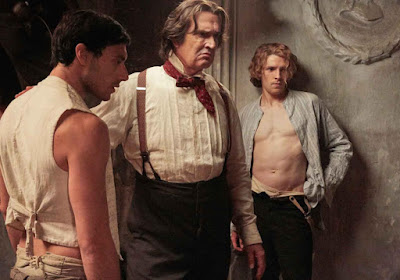The final years of Oscar Wilde, with a few flashbacks to happier times, are shown us in THE HAPPY PRINCE, a new film from Rupert Everett -- who not only wrote and directed but stars in it, too, as Oscar himself. He makes a wonderful Wilde, as good as Robert Morley, Peter Finch and even Stephen Fry, who, up to now, had been TrustMovies' favorite Oscar. Best of all, the movie that surrounds the character is very good indeed -- written and directed with finesse and subtlety, allowing us to see pieces of this man that come together to form quite a whole.
Mr. Everett, above and below, allows us to see not only the dissipated older Wilde (who can still belt out a nifty music hall ditty and/or enjoy pleasuring a much younger man) but also gives us glimpses of the successful playwright and bon vivant whose work set audiences laughing so merrily for so long.
The Happy Prince is both the title of the movie and of a story (first published in 1888) that Wilde wrote for children (he was a master at this, just as he was at theater), and Everett threads this sad, sweet tale throughout his movie, as Wilde is first seen reading it to his own children and later to one of the young boys he has befriended and cared for who loves to hear his stories.
Woven into this are Wilde's friendships with Reggie Turner (Colin Firth, above) and Robbie Ross (a wonderful Edwin Thomas, below, left), both of whom were great and good friends to Wilde, helping him through some of the darkest times.
And of course there is "Bosie," Oscar's most beloved friend and lover, Lord Alfred Douglas (Colin Morgan, below), portrayed here, as usual, as the young twit/twat most responsible for Oscar's downfall. How you'll wish that Wilde had a bit more sense in choosing a soulmate, but, as ever, the heart has its reasons....
The movie moves from a rainy, bleak Paris to sunny Italy and back. Though quite obviously a labor of love on the part of the filmmaker, Everett has made it with enough intelligence and discipline to pass muster in every respect. The pacing proves near-perfect, while the many small, impressionistic incidents slowly build and combine to offer up a marvelous, productive, sad, beautiful and far-too-short life. I think Wilde himself would have loved this film.
From Sony Pictures Classics and running 105 minutes, The Happy Prince, after opening on both coasts and elsewhere, hits South Florida this coming Friday, October 26. In the Miami areas, look for it at the AMC Aventura 24 and the Regal South Beach 18; in Fort Lauderdale at the Classic Gateway, and in Boca Raton at the Living Room Theaters and the Regal Shadowood 16; and at the Movies of Delray and Lake Worth. Wherever you live around the country, to find a theater near you, click here and then click on GET TICKETS in the task bar.

























































